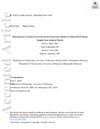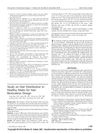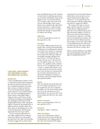 14 citations,
August 2009 in “Cancer epidemiology”
14 citations,
August 2009 in “Cancer epidemiology” AHCC reduces hair loss and liver injury caused by chemotherapy in rodents.
 9 citations,
June 2011 in “International Journal of Cosmetic Science”
9 citations,
June 2011 in “International Journal of Cosmetic Science” The new mild shampoo helped prevent hair loss in the subjects.
 5 citations,
June 2016 in “Dermatologic Surgery”
5 citations,
June 2016 in “Dermatologic Surgery” Hair restoration for East Asians should consider their unique characteristics like head shape, hair thickness, and hair density, and use modified procedures and treatments to minimize scarring and maintain hair density.
 5 citations,
November 2011 in “Expert Review of Dermatology”
5 citations,
November 2011 in “Expert Review of Dermatology” The document concludes that early diagnosis and a comprehensive treatment plan are crucial for managing hair loss in children, with a focus on both medical and psychological support.
 4 citations,
May 2021 in “Dermatologic Clinics”
4 citations,
May 2021 in “Dermatologic Clinics” The conclusion is that hair loss in women is caused by a mix of hormonal, environmental, and genetic factors, and treatments should target these various causes.
 4 citations,
May 2012 in “Tissue Engineering and Regenerative Medicine”
4 citations,
May 2012 in “Tissue Engineering and Regenerative Medicine” Scientists created three types of structures to help regrow hair follicles, and all showed promising results for hair regeneration.
 October 2023 in “Dermatology practical & conceptual”
October 2023 in “Dermatology practical & conceptual” Many patients experienced hair loss after COVID-19, with women affected more, starting on average 49 days post-infection.
 September 2023 in “International journal of Unani and integrative medicine”
September 2023 in “International journal of Unani and integrative medicine” Hair loss patterns are linked to temperament and can help diagnose it.
 January 2012 in “Elsevier eBooks”
January 2012 in “Elsevier eBooks” Hair transplantation is highly effective with careful technique and attention to patient needs.
 July 2021 in “Medical journal, Armed Forces India”
July 2021 in “Medical journal, Armed Forces India” Using platelet-rich plasma in hair restoration surgery significantly improves hair density after 6 months and is safe to use.
 138 citations,
March 2001 in “Clinics in Dermatology”
138 citations,
March 2001 in “Clinics in Dermatology” Hair loss can significantly affect a person's self-esteem and body image, especially in young people, those who value their looks highly, and women.
 47 citations,
July 2014 in “European Journal of Pharmaceutics and Biopharmaceutics”
47 citations,
July 2014 in “European Journal of Pharmaceutics and Biopharmaceutics” Scientists created a gel with nanoparticles to deliver medicine to hair follicles effectively.
 26 citations,
October 2012 in “Dermatologic Clinics”
26 citations,
October 2012 in “Dermatologic Clinics” The document details hair transplantation techniques and innovations, highlighting Follicular Unit Transplantation as the standard and discussing the effectiveness and challenges of the procedure.
 25 citations,
March 2017 in “Journal of Dermatological Treatment”
25 citations,
March 2017 in “Journal of Dermatological Treatment” Platelet-rich plasma treatment for non-scarring hair loss shows mixed results and needs more research.
 15 citations,
January 2016 in “Sustainable development and biodiversity”
15 citations,
January 2016 in “Sustainable development and biodiversity” Using PGPR as biofertilizers can improve soil health and plant growth while reducing reliance on synthetic fertilizers.
 11 citations,
November 2012 in “Seminars in Cutaneous Medicine and Surgery”
11 citations,
November 2012 in “Seminars in Cutaneous Medicine and Surgery” Genetic factors affect hair loss, and molecular testing may help predict, diagnose, and treat it.
 10 citations,
January 2011 in “Journal of Cutaneous and Aesthetic Surgery”
10 citations,
January 2011 in “Journal of Cutaneous and Aesthetic Surgery” Surgical methods for hair loss are less common than hair transplants but still useful, especially for scarring hair loss.
 8 citations,
August 2020 in “Experimental dermatology”
8 citations,
August 2020 in “Experimental dermatology” PRP therapy for alopecia shows inconsistent results due to natural variability in growth factor secretion by platelets.
 7 citations,
October 2018 in “Journal of Craniofacial Surgery”
7 citations,
October 2018 in “Journal of Craniofacial Surgery” About 21.3% of young, healthy Chinese men experience hair loss. Hairlines are mostly linear or have a central protrusion. Hair is densest on the top and back of the head, and hair follicles usually have 1 or 2 hairs. This information can help in designing hair restoration procedures.
 6 citations,
April 2023 in “Frontiers in plant science”
6 citations,
April 2023 in “Frontiers in plant science” Certain bacteria can boost lentil growth and improve soil used for farming.
 4 citations,
November 2020 in “Journal of Cosmetic Dermatology”
4 citations,
November 2020 in “Journal of Cosmetic Dermatology” Most Facebook posts about hair loss treatments are promotional and not medically supported, with better quality information found on YouTube.
 September 2004 in “Atlas of the Oral and Maxillofacial Surgery Clinics”
September 2004 in “Atlas of the Oral and Maxillofacial Surgery Clinics” Hair restoration surgery techniques can effectively treat scalp deformities and have evolved to provide natural-looking results.
 July 2021 in “PARIPEX INDIAN JOURNAL OF RESEARCH”
July 2021 in “PARIPEX INDIAN JOURNAL OF RESEARCH” PRP injections significantly improve hair regrowth in alopecia areata.
 August 2015 in “Advances in Small Animal Medicine and Surgery”
August 2015 in “Advances in Small Animal Medicine and Surgery” Low-level laser therapy may help regrow hair in dogs with non-inflammatory hair loss.
 129 citations,
January 2009 in “International Journal of Trichology”
129 citations,
January 2009 in “International Journal of Trichology” Trichoscopy can diagnose female hair loss with high accuracy by looking for specific patterns in hair and scalp appearance.
 11 citations,
July 2017 in “Expert Opinion on Investigational Drugs”
11 citations,
July 2017 in “Expert Opinion on Investigational Drugs” New hair loss treatments may include topical medications, injections, and improved transplant methods.
 March 2021 in “Dermatological reviews”
March 2021 in “Dermatological reviews” Hair transplant works well, but needs more research for better results.
 179 citations,
September 1998 in “BMJ”
179 citations,
September 1998 in “BMJ” Hair loss in men is common, treatable, but not curable.
 88 citations,
January 2013 in “Indian Journal of Dermatology, Venereology and Leprology”
88 citations,
January 2013 in “Indian Journal of Dermatology, Venereology and Leprology” Minoxidil and finasteride effectively treat hair loss.
 87 citations,
September 2016 in “Dermatologic Surgery”
87 citations,
September 2016 in “Dermatologic Surgery” PRP shows potential for treating female hair loss, but more research needed.





























